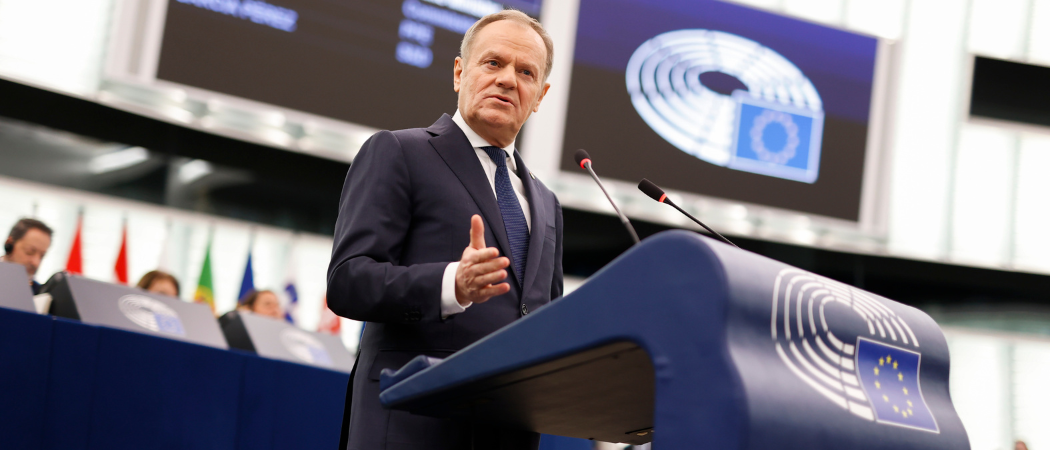AI in science, the interim evaluation of Horizon Europe, and arming the EU drive the agenda

Polish Prime Minister Donald Tusk presenting the presidency’s programme to the European Parliament in Strasbourg on January 22, 2025. Photo credits: Mathieu Cugnot / European Union
Poland plans to use its six-month presidency of the European Council to advance the uptake of artificial intelligence in science, and to lay the groundwork for FP10, the next Framework Programme for research and innovation.
Europe’s two million researchers should be seen as “our advantage over our competitors,” said Magdalena Kula, research attaché at the Polish permanent representation to the EU, as she presented the presidency’s research and innovation priorities at an event in Brussels on January 22.
Poland has chosen the slogan “Security, Europe!” for its presidency, which kicked off at the turn of the year. Defence is a major priority, given the country’s geographical proximity to Russia, but the focus is also on other types of security, including economic, food, health and cybersecurity.
Research and innovation will be a common thread running through these diverse topics, and the presidency wants to ensure that researchers are “seen and heard” in policy creation, Kula said.
When it comes to AI, there is an opportunity for Europe to “empower and upskill our researchers to use AI tools and technologies, in order to increase the productivity of research and innovation efforts,” she said.
Poland will propose Council conclusions to this effect in the coming months. These will stress that access to AI tools for research “should be as democratic as possible” and not deepen disparities across the scientific community, Kula said.
FP10 in the background
While FP10 is not mentioned in the official programme of the presidency, it will feature prominently in its activities.
Poland will host the first high-level political debate on FP10, during the informal competitiveness Council meeting in Warsaw on March 10-11, when research ministers will discuss the expectations of the research and innovation community, and their countries’ priorities. The presidency will then propose a Warsaw declaration in the hope of agreeing on a common position.
At the formal competitiveness Council meeting on May 23 ministers will discuss the outcome of the interim evaluation of Horizon Europe, which is due to be published in April. They will share their key takeaways from the report, not only for FP10, but also for the final years of the current programme.
“If you want to build a proper discussion on the future of the Framework Programme, we need those numbers. We need to know what Horizon Europe has delivered, what worked, what didn’t work, and to build our discussion on the facts and data,” Kula said.
Poland will prepare Council conclusions on the interim evaluation alongside Denmark, which will hold the presidency during the second half of the year. The Commission proposal for FP10 should also arrive during the Danish presidency.
One of the big question marks hanging over FP10 is the budget, with MEPs, advisors, and lobby groups all calling for the Horizon Europe budget to be more than doubled to €220 billion. However, Research Commissioner Ekaterina Zaharieva has told Science|Business that it would not be realistic to promise such a significant increase.
Kula said that European research ministers would all like to see an ambitious budget, but the main discussions will take place between finance ministers.
Another important file for the first half of the year will be the European Research Area policy agenda for 2025-27, which will be adopted in the form of a Council recommendation.
Poland will also work on the extension of the Euratom programme for nuclear research and innovation beyond 2027.
Boosting EU defence
Meanwhile, Polish Prime Minister Donald Tusk presented the presidency’s broad programme to the European Parliament in Strasbourg, with security and defence topping the agenda. This included a call for spending on external security and defence to rise to 5% of GDP.
“If Europe is to survive, it needs to be armed,” he said. "Do not ask America what it can do for our security, ask yourselves what we can do for our security," he added, urging Europe to take greater responsibility for its own defence.
Tusk called on the Parliament to tackle major challenges, such as curbing energy prices and energy dependence on third countries, in order to safeguard the EU’s competitiveness. He also urged MEPs to deregulate legislation, including under the Green Deal, to make sure EU citizens have access to cheaper energy.
“Some of EU regulations have unfortunately led to a situation in which energy prices are high, too high. This is unacceptable,” Tusk said.
Turning to health security, he highlighted the importance of addressing the growing mental health crisis, and stressed the need to protect young people from exposure to harmful online content.
Following Tusk’s address, Commissioner Dubravka Šuica outlined the Commission’s initiatives under the seven security dimensions prioritised by the Polish presidency. This includes a white paper on the future of European defence, which should be published in March.





 A unique international forum for public research organisations and companies to connect their external engagement with strategic interests around their R&D system.
A unique international forum for public research organisations and companies to connect their external engagement with strategic interests around their R&D system.